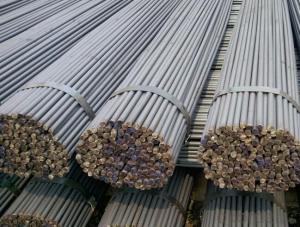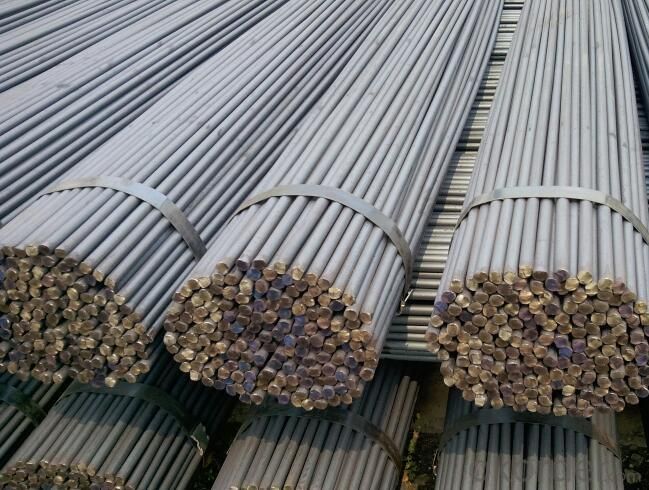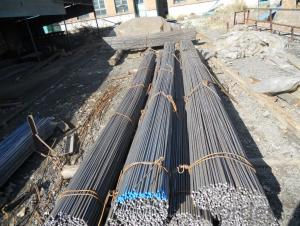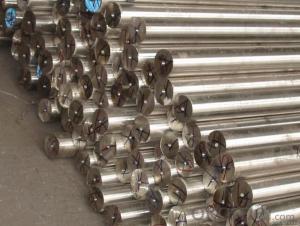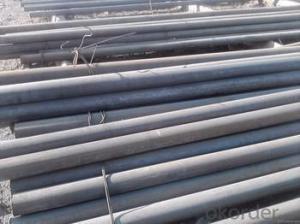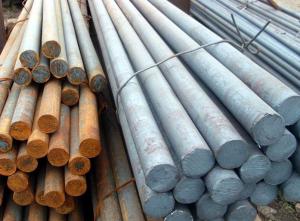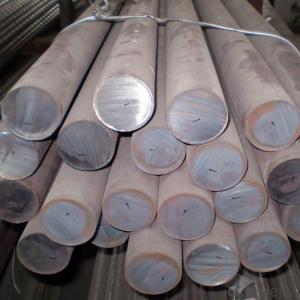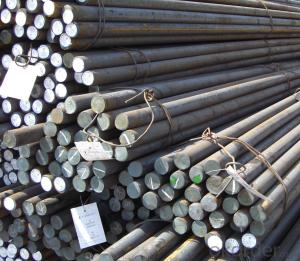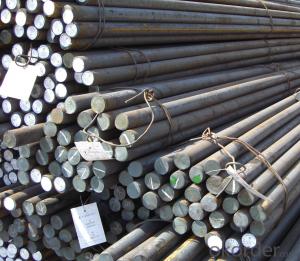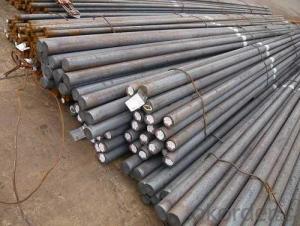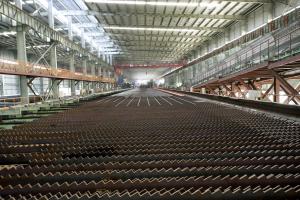Prime Low Carbon Iron Round Bars Hot Rolled
- Loading Port:
- China main port
- Payment Terms:
- TT OR LC
- Min Order Qty:
- 100 m.t.
- Supply Capability:
- 5000 m.t./month
OKorder Service Pledge
OKorder Financial Service
You Might Also Like
Product Description:
OKorder is offering Prime Low Carbon Iron Round Bars Hot Rolled at great prices with worldwide shipping. Our supplier is a world-class manufacturer of steel, with our products utilized the world over. OKorder annually supplies products to African, South American and Asian markets. We provide quotations within 24 hours of receiving an inquiry and guarantee competitive prices.
Product Applications:
Prime Low Carbon Iron Round Bars Hot Rolled are ideal for structural applications and are widely used in the construction of buildings and bridges, and the manufacturing, petrochemical, and transportation industries.
Product Advantages:
OKorder's Prime Low Carbon Iron Round Bars Hot Rolled are durable, strong, and wide variety of sizes.
Main Product Features:
· Premium quality
· Prompt delivery & seaworthy packing (30 days after receiving deposit)
· Can be recycled and reused
· Mill test certification
· Professional Service
· Competitive pricing
Product Specifications:
Manufacture: Hot rolled
Grade: Q195 – 235
Certificates: ISO, SGS, BV, CIQ
Length: 6m – 12m, as per customer request
Packaging: Export packing, nude packing, bundled
| ROUND BAR | |
| SIZE d(mm) | theoretical kg/m |
| 5.5 | 0.186 |
| 6 | 0.222 |
| 7 | 0.302 |
| 8 | 0.395 |
| 9 | 0.499 |
| 10 | 0.617 |
| 11 | 0.746 |
| 12 | 0.888 |
| 13 | 1.04 |
| 14 | 1.21 |
| 15 | 1.39 |
| 16 | 1.58 |
| 17 | 1.78 |
| 18 | 2 |
| 19 | 2.23 |
| 20 | 2.47 |
| 21 | 2.72 |
| 22 | 2.98 |
| 24 | 3.55 |
| 25 | 3.85 |
| 26 | 4.17 |
| 28 | 4.83 |
| 30 | 5.55 |
| 32 | 6.31 |
| 34 | 7.13 |
| 36 | 7.99 |
| 38 | 8.9 |
| 40 | 9.86 |
| 42 | 10.9 |
| 45 | 12.5 |
| 48 | 14.2 |
| 50 | 15.4 |
| 53 | 17.3 |
| 56 | 19.3 |
| 60 | 22.2 |
| 63 | 24.5 |
| 65 | 26 |
| 70 | 30.2 |
| 75 | 34.7 |
| 80 | 39.5 |
| 85 | 44.5 |
| 90 | 49.9 |
| 95 | 55.6 |
| 100 | 61.7 |
FAQ:
Q1: Why buy Materials & Equipment from OKorder.com?
A1: All products offered byOKorder.com are carefully selected from China's most reliable manufacturing enterprises. Through its ISO certifications, OKorder.com adheres to the highest standards and a commitment to supply chain safety and customer satisfaction.
Q2: How many tons of steel products could be loaded in containers?
A2: Usually the steel products are delivered by bulk vessel because of the large quantity and the freight. However, there are no bulk vessel enter some seaports so that we have to deliver the cargo by containers. The 6m steel product can be loaded in 20FT container, but the quantity is changed according to the size, usually from 18tons to 25tons.
Q3: what is the difference between actual weight and theoretical weight?
A3: All the section steel has two weights: actual weight and theoretical weight. Actual weight is the weighing out when the product delivered from the mill. Theoretical weight is calculated by pieces. The invoice can be based on each of them as your request.
Images:
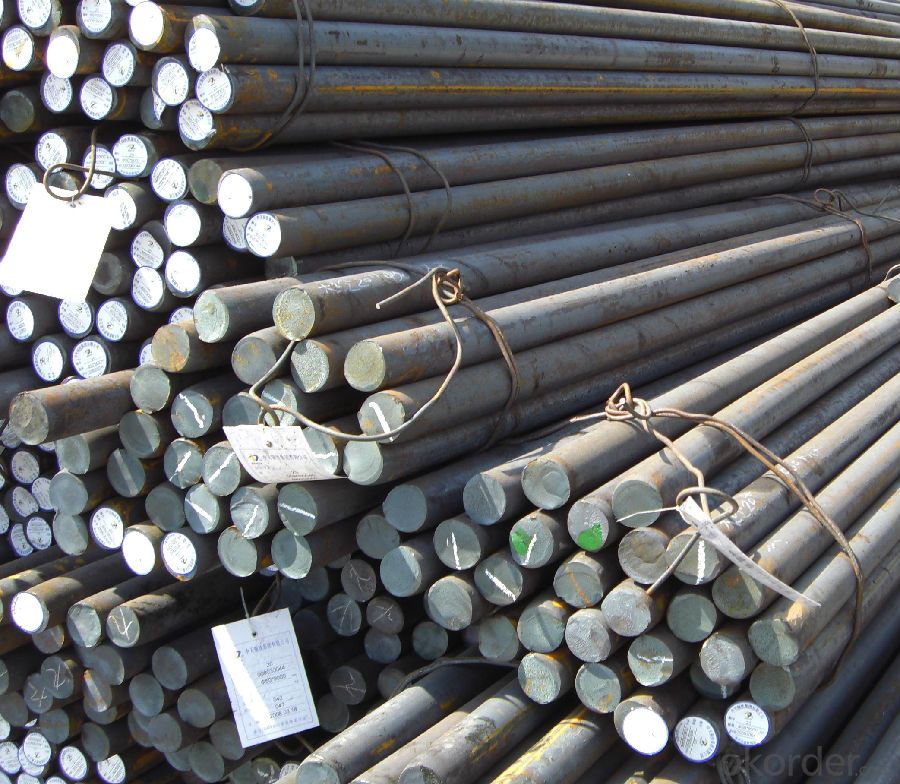
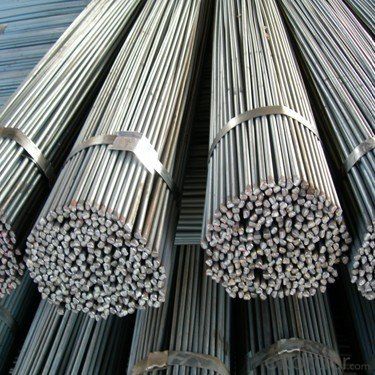
- Q: Can steel round bars be used for making steering linkages?
- Making steering linkages is one application where steel round bars can be used. Steel round bars have a wide range of uses in automotive and mechanical engineering due to their strength, durability, and resistance to wear and tear. Steering linkages play a crucial role in a vehicle's steering system as they transmit the steering input from the steering wheel to the wheels. By using steel round bars, the necessary strength and rigidity are provided, ensuring efficient and reliable steering performance. However, it is important to consider other factors like specific design requirements, weight considerations, and desired level of flexibility or torsional properties when choosing the appropriate type and size of steel round bar for steering linkages.
- Q: What are the advantages of using carbon steel round bars?
- The advantages of using carbon steel round bars include high strength and durability, excellent machinability, and cost-effectiveness. Carbon steel round bars are known for their superior tensile strength, making them suitable for heavy-duty applications. They are also highly resistant to wear and tear, ensuring long-lasting performance. Additionally, carbon steel round bars can be easily shaped and formed, making them ideal for machining processes. Lastly, carbon steel round bars are relatively affordable compared to other materials, providing a cost-effective solution for various industries.
- Q: Are steel round bars resistant to chemicals or acids?
- Yes, steel round bars are generally resistant to chemicals and acids due to their high corrosion resistance properties. However, the level of resistance may vary depending on the specific type of steel and the concentration and temperature of the chemicals or acids involved.
- Q: What is the maximum vanadium content allowed for steel round bars?
- The maximum vanadium content allowed for steel round bars varies depending on the specific steel grade and industry standards. Vanadium is commonly used as an alloying element in steel to improve its strength, hardness, and resistance to corrosion. In general, the maximum vanadium content in steel round bars ranges from 0.02% to 0.25%. However, it is important to note that different steel grades and applications may have specific limits set by industry regulations or customer requirements. Therefore, it is crucial to consult the relevant standards and specifications for the specific steel grade and application to determine the maximum allowed vanadium content for steel round bars.
- Q: What are the different types of steel round bars used in the automotive aftermarket?
- There are several different types of steel round bars commonly used in the automotive aftermarket. These include: 1. Carbon Steel Round Bars: Carbon steel is a commonly used material in the automotive industry due to its high strength and durability. It is often used in applications that require heavy-duty performance, such as suspension components, drive shafts, and steering linkages. 2. Alloy Steel Round Bars: Alloy steel is a type of steel that has been alloyed with other elements to enhance its mechanical properties. It is commonly used in the automotive aftermarket for applications that require high strength, such as crankshafts, camshafts, and axles. 3. Stainless Steel Round Bars: Stainless steel is known for its corrosion resistance and aesthetic appeal. It is often used in automotive aftermarket applications that require resistance to harsh environments, such as exhaust systems, trim components, and decorative elements. 4. Tool Steel Round Bars: Tool steel is a type of high-carbon steel that is specifically designed for tooling and machining applications. It is commonly used in the automotive aftermarket for manufacturing specialized tools, dies, and molds. 5. Bearing Steel Round Bars: Bearing steel is a type of high-carbon steel that is specifically designed for bearing applications. It is commonly used in the automotive aftermarket for manufacturing bearings and other rotating components. These are just a few examples of the different types of steel round bars used in the automotive aftermarket. The specific type of steel chosen for a particular application will depend on factors such as the required strength, durability, and corrosion resistance.
- Q: Can steel round bars be used in the manufacturing of pumps?
- Indeed, pumps can be manufactured using steel round bars. These round bars are widely utilized in diverse industries owing to their robustness, longevity, and adaptability. In the realm of pump manufacturing, steel round bars are frequently employed as shafts or rotors due to their capacity to endure intense pressure and rotational forces. To meet the specific demands of pump designs, these round bars can be subjected to machining, forging, or heat treatment processes. Moreover, steel round bars offer exceptional resistance to corrosion, rendering them suitable for pumps deployed in a variety of environments. On the whole, steel round bars constitute a dependable and prevalent material in the realm of pump manufacturing.
- Q: Weight algorithm of round steel
- Round steel weight = density * volume = density * base area * length of round bar.Round steel is a solid strip of steel whose cross section is round. Its specifications are expressed in diameter, in units of millimeters (mm), such as "50mm", which means a diameter of 50 millimeters of round steel.
- Q: Is round bar steel?
- Round steel is the term of steel structure, and the requirement of material is different from that of concrete structure.
- Q: What are the advantages of using carbon-manganese alloy steel round bars?
- Carbon-manganese alloy steel round bars offer numerous benefits: Firstly, they provide exceptional strength and durability, making them ideal for demanding applications. These bars can withstand heavy loads and resist deformation, ensuring long-lasting performance. Secondly, they possess excellent impact resistance, making them highly suitable for situations where there is a risk of impact or sudden loads. This feature helps to prevent fractures or breakages, enhancing safety and reliability. Furthermore, carbon-manganese alloy steel round bars have good weldability, allowing for easy fabrication and joining. They can be easily welded using common techniques, making them versatile and cost-effective for various construction projects. In addition, these bars exhibit good corrosion resistance, making them suitable for use in environments where exposure to moisture or corrosive substances is a concern. This property helps to extend the lifespan of the bars and reduces the need for frequent maintenance and replacement. Moreover, carbon-manganese alloy steel round bars are generally more cost-effective compared to other high-strength steel options. They offer a balance between strength and affordability, making them a cost-efficient choice for applications where high-strength materials are needed without excessive costs. Lastly, these bars are relatively easy to machine, allowing for precise shaping and finishing. This feature makes them suitable for applications that require complex or custom designs. Overall, the advantages of using carbon-manganese alloy steel round bars include their strength, durability, impact resistance, weldability, corrosion resistance, cost-effectiveness, and machinability. These properties make them a reliable and versatile choice for a wide range of applications in industries such as construction, automotive, and manufacturing.
- Q: Are steel round bars suitable for architectural applications?
- Yes, steel round bars are suitable for architectural applications. They offer strength, durability, and versatility, allowing them to be used in various architectural designs such as railings, sculptures, and decorative elements. Steel round bars can be easily fabricated and have a sleek and modern aesthetic, making them a popular choice in the architectural industry.
Send your message to us
Prime Low Carbon Iron Round Bars Hot Rolled
- Loading Port:
- China main port
- Payment Terms:
- TT OR LC
- Min Order Qty:
- 100 m.t.
- Supply Capability:
- 5000 m.t./month
OKorder Service Pledge
OKorder Financial Service
Similar products
Hot products
Hot Searches
Related keywords
